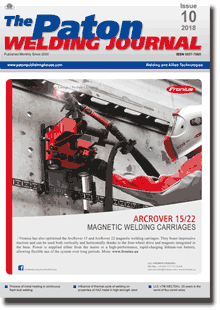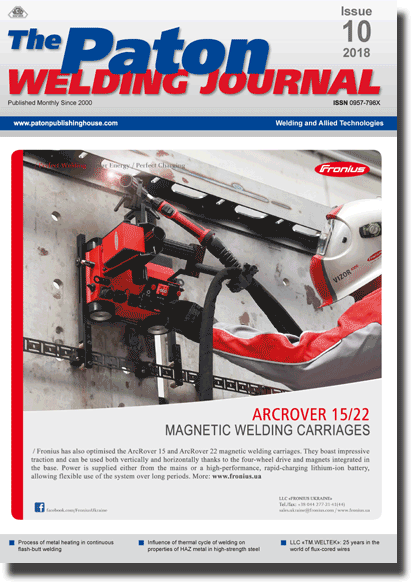| 2018 №10 (04) |
DOI of Article 10.15407/tpwj2018.10.05 |
2018 №10 (06) |

The Paton Welding Journal, 2018, #10, 26-32 pages
Influence of activators on the quality of spirally-welded pipes, produced with aplication of high-frequency welding
V.V. Polukhin, A.S. Prokofiev, D.V. Romashko, S.V. Rymar and R.S. Gubatyuk
E.O. Paton Electric Welding Institute of the NAS of Ukraine 11 Kazimir Malevich Str., 03150, Kyiv, Ukraine. E-mail: office@paton.kiev.ua
The paper deals with development of the high-frequency welding technology in manufacture of thin-walled spirally-welded pipes by adding activators to the weld zone and applying the pressure to improve the strength characteristics of welded joint metal. Investigations are based on scientific principles of theoretical fundamentals of welding, materials science and problems of metal strength. A specifics of the welding technology considered is the fact that during heating of edges to be joined by high frequency currents the activators, having lower melting temperatures, transition to the liquid state, bind surface contaminations and transport them to the surface at pressure applying. Edges of the cleaned metal are joined as a result of running of diffusion processes at temperatures close to base metal melting temperatures. In principle, the process of joining at the final stage proceeds with the weld metal being in the solid phase. The obtained weld width does not exceed 4–8 μm. Weld metal consists of the base metal being welded, enriched in activator elements. Near-weld zone structure is close to that of the base metal. Thin-walled spirally-welded pipes can be produced with a high quality of welded joint at a high welding speed. 21 Ref., 3 Tables, 5 Figures.
Keywords: thin-walled spirally-welded pipes, welding, high-frequency current, pressure application, activators
Received: 11.09.18
Published: 18.12.18
References
1. Pismenny, A.S. (1997) High-frequency welding of metals. Amsterdam, Harwood Acad. Publ.
2. Pismenny, A.S. (2008) High-frequency welding of metal products. Kiev, PWI [in Russian].
3. Pismenny, A.S., Polukhin, V.V., Polukhin, Vl.V. et al. (2005) Production and application of thin-walled spiral-welded pipes. The Paton Welding J., 9, 29–32.
4. Pismenny, A.S., Prokofiev, A.S., Gubatyuk, R.S. et al. (2012) Increase of strength characteristics of spirally-welded pipes of structural designation. Ibid., 3, 30–34.
5. Lebedev, V.K., Skachko, Yu.N., Polukhin, V.V. et al. (1974) Fusion of edges in high-frequency welding. Avtomatich. Svarka, 11, 16–19 [in Russian].
6. Slepak, E.S., Khasnulin, V.S., Kluzhinsky, V.L., Shulman, I.E. (1980) High-frequency welding in power engineering. Moscow, Mashinostroenie [in Russian].
7. Tabelev, V.D., Kareta, N.L., Panasenko, A.I. et al. (1985) Structure and phase composition of welds made by capillary brazing under pressure. Avtomatich. Svarka, 11, 26–29 [in Russian].
8. Tabelev, V.D. (1991) On formation of joints in brazing with plastic deformation of base metal. In: Materials and technology of brazing. Kiev, PWI, 50–54 [in Russian].
9. Lebedev, V.K., Tabelev, V.D., Pismenny, A.S. (1993) Impact strength of butt joints brazed with plastic deformation of base metal. Avtomatich. Svarka, 8, 29–31 [in Russian].
10. Lebedev, V.K., Tabelev, V.D., Pismenny, A.S. (1983) Butt pressure brazing of steel pipelines. Ibid., 9, 25–27 [in Russian].
11. Lebedev, V.K., Pismenny, A.S., Martynova, T.I. (1992) Experience of application of composite filler metal for pressure braze-welding. Ibid., 9-10, 42–43 [in Russian].
12. Pismenny, A.S., Novikova, D.P., Yukhimenko, R.V. et al. (2008) Technology peculiarities of high-frequency seam braze-welding of pipes. The Paton Welding J., 2, 22–25.
13. Pismenny, A.S., Prokofiev, A.S. (2002) Press welding of pipes using activating materials. Ibid., 7, 19–23.
14. Pismenny, A.S., Polukhin, V.V., Prokofiev, A.S. et al. (2002) Express-method for development and verification of pressure brazing technologies. Ibid., 1, 47–50.
15. Prokofiev, A.S., Pismenny, A.S., Bondarev, V.A. et al. (2001) Induction braze-welding of no-accessory T-joints. Ibid., 4, 43–47.
16. Prokofiev, A.S., Pismenny, A.S. (2000) Technology of brazewelding of flanges to tubes. Ibid., 5, 48–50.
17. (1999) DSTU 3761.2-98 (ISO 857:1990): Welding and allied processes. Pt 2: Welding and brazing processes. Terms and definitions. Kyiv, Derzhspozhyvstandart Ukrainy [in Ukrainian].
18. Filler materials. URL:http://termoizolit.ru/pripoi [in Russian].
19. Steels and alloys grades. URL:http://www.splav-kharkov.com/choose_type.php [in Russian].
20. Surfacing powder. URL: https://grandlada.com/naplavochniy-poroshok/131 [in Russian].
21. Pantelejmonov, E.A., Samofalov, M.V. (2012) Application of electric parameters of high-frequency welding mode of spirally-welded pipes for organization of management and control processes. Svarshchik, 4, 10–12 [in Russian].
Suggested Citation
V.V. Polukhin, A.S. Prokofiev, D.V. Romashko, S.V. Rymar and R.S. Gubatyuk (2018) Influence of activators on the quality of spirally-welded pipes, produced with aplication of high-frequency welding. The Paton Welding J., 10, 26-32.The cost of subscription/purchase order journals or individual articles
| Journal/Currency | Annual Set | 1 issue printed |
1 issue |
one article |
| TPWJ/USD | 384 $ | 32 $ | 26 $ | 13 $ |
| TPWJ/EUR | 348 € | 29 € | 24 € | 12 € |
| TPWJ/UAH | 7200 UAH | 600 UAH | 600 UAH | 280 UAH |
| AS/UAH | 1800 UAH | 300 UAH | 300 UAH | 150 UAH |
| AS/USD | 192 $ | 32 $ | 26 $ | 13 $ |
| AS/EUR | 180 € | 30 € | 25 € | 12 € |
| SEM/UAH | 1200 UAH | 300 UAH | 300 UAH | 150 UAH |
| SEM/USD | 128 $ | 32 $ | 26 $ | 13 $ |
| SEM/EUR | 120 € | 30 € | 25 € | 12 € |
| TDNK/UAH | 1200 UAH | 300 UAH | 300 UAH | 150 UAH |
| TDNK/USD | 128 $ | 32 $ | 26 $ | 13 $ |
| TDNK/EUR | 120 € | 30 € | 25 € | 15 € |
AS = «Automatic Welding» - 6 issues per year;
TPWJ = «PATON WELDING JOURNAL» - 12 issues per year;
SEM = «Electrometallurgy Today» - 4 issues per year;
TDNK = «Technical Diagnostics and Non-Destructive Testing» - 4 issues per year.


